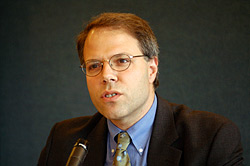Washington, D.C.
A May 10 Associated Press article reports that U.S. District Judge Ricardo Urbina is allowing four former detainees at Guantanamo Bay, Cuba, to pursue a lawsuit alleging their U.S. captors violated their religious rights.
The Pew Forum responds to questions raised by the news.
Featuring: David Masci, Senior Research Fellow, Pew Forum on Religion & Public Life

Why is this lawsuit – involving four former detainees at Guantanamo Bay, Cuba – potentially significant?
The federal judge has said that the Religious Freedom Restoration Act applies to people who are not U.S. citizens or residents and who are not even living in the United States but are in a U.S. facility overseas. By extending these protections to prisoners in Guantanamo, the court is expanding the notion of what it means for the state to protect religious liberty, and that is significant.
What is the Religious Freedom Restoration Act and how does it apply to this case?
The Religious Freedom Restoration Act, or RFRA, aims to prevent the government from interfering with religious freedom unless it’s absolutely necessary. The law states that the government may not restrict religious worship or practices unless it is furthering a compelling state interest and is using the least restrictive means possible to advance that interest. In practice, this makes it difficult, though not impossible, for the government to justify actions that significantly restrict legitimate religious expression.
How does RFRA differ from RLUIPA?
RFRA, which was enacted in 1993, only applies to the actions of the federal government. Originally, the law also applied to state and local government actions. But in 1997, the Supreme Court ruled that applying RFRA to the states violated the principles of federalism by unconstitutionally impinging upon state authority. In response, Congress passed the 2000 Religious Land Use and Institutionalized Persons Act (RLUIPA). The new law applied RFRA’s “compelling interest” standard to states only with regard to land use issues (a conflict, for example, between a church and a zoning board) and the religious freedom of prisoners and others in state institutions. Last year, the Supreme Court upheld the constitutionality of RLUIPA. But RLUIPA has no bearing on the Guantanamo case because it involves federal rather than state authorities.
Are people in prison entitled to their religious rights?
People in prison lose many of their rights – such as the right to vote. But many basic constitutional guarantees, including freedom of worship, still apply to prisoners. Furthermore, many prisoners have alleged that their religious liberties have been unconstitutionally curtailed and have sued the state or federal government.
Additional Resources
Religious Freedom Restoration Act of 1993
Case Overview from the Center for Constitutional Rights, which is representing the detainees




